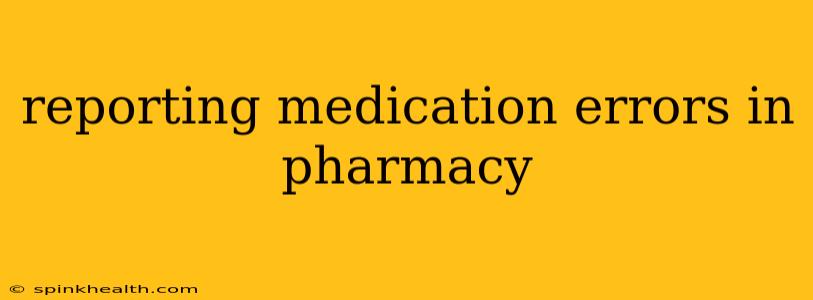Medication errors in pharmacies are a serious concern, impacting patient safety and potentially leading to devastating consequences. It's not just a matter of following protocol; it’s about upholding a sacred trust. The responsibility to report these errors rests squarely on the shoulders of every pharmacist and pharmacy technician, and understanding the process is crucial. This isn't just about ticking boxes; it's about learning, improving, and safeguarding lives.
My journey as a pharmacist has taught me the importance of vigilance. One day, I noticed a discrepancy in a prescription—a dosage far exceeding the usual. That split-second of doubt led to a thorough review, and ultimately, prevented a potentially fatal overdose. This experience cemented my belief in the critical role of error reporting.
What Constitutes a Medication Error?
A medication error encompasses any preventable event that could cause or lead to inappropriate medication use or patient harm while the medication is in the control of the healthcare professional, patient, or consumer. This broad definition includes everything from dispensing the wrong medication to incorrect labeling, dosage miscalculations, and even failing to provide adequate patient counseling.
How to Report Medication Errors in a Pharmacy
Reporting a medication error involves several key steps. First, identify the error—pinpoint exactly what went wrong. Then, document everything thoroughly. This includes details such as the patient's name (or patient identifier, if anonymity is preserved), the medication involved, the type of error, and the potential consequences. Finally, report the error through the appropriate channels. This may involve internal reporting systems within your pharmacy, reporting to state boards of pharmacy, or even using national reporting systems like MedWatch.
What if I made the error?
It's natural to feel apprehensive about reporting your own mistake. However, remember that the primary goal is patient safety, and reporting your error is a crucial step in preventing similar incidents in the future. Many pharmacies have systems in place to support staff who report errors, fostering a culture of transparency and learning. The focus should be on correcting the mistake, learning from it, and preventing future occurrences.
Why is Reporting Medication Errors Important?
The importance of reporting medication errors cannot be overstated. It allows for:
- Identifying trends and patterns: By analyzing reported errors, we can identify systemic issues, flawed processes, or areas needing improvement.
- Improving patient safety: Learning from past mistakes helps prevent future errors and protects patients.
- Enhancing pharmacy practices: Reporting prompts reviews of workflows and training programs, leading to safer and more efficient systems.
- Protecting legal liability: While not the primary reason, thorough reporting demonstrates a commitment to patient safety, which can be valuable in legal situations.
What are the potential consequences of medication errors?
H2: What are the potential consequences of medication errors?
The consequences of medication errors can range from mild to severe, potentially including adverse drug reactions, hospitalizations, and even death. The severity depends on many factors, including the type of error, the drug involved, and the patient's health status.
H2: What is the role of technology in preventing medication errors?
Technology plays an increasingly crucial role in minimizing medication errors. Automated dispensing systems, barcode scanning, and electronic health records all contribute to improved accuracy and reduced risk. However, it is critical to remember that technology is only a tool; vigilance and professional judgment remain paramount.
H2: How can I improve my skills to prevent medication errors?
Continuous professional development, staying updated on medication information, and participating in error prevention training are essential to minimizing medication errors. Moreover, fostering a strong culture of safety, collaboration, and open communication within the pharmacy team is crucial.
H2: Are there any legal ramifications for not reporting medication errors?
Failure to report medication errors can lead to disciplinary actions, including fines or suspension of licenses. The specific legal implications depend on local regulations and the severity of the error.
By actively participating in error reporting, we contribute to a safer healthcare environment and protect our patients. Remember, reporting an error isn't an admission of guilt; it's a commitment to excellence and a testament to the profession's dedication to patient well-being. Let’s make patient safety our top priority.

